 Libri di Nestor Makhno su Unilibro.it
)
Libri di Nestor Makhno su Unilibro.it
)
|
|
2023 |
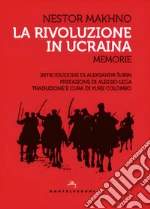 Title :
La rivoluzione in Ucraina
Title :
La rivoluzione in UcrainaAuthor: Makhno Nestor; Colombo Y. (cur.) Publisher: Castelvecchi Le memorie di Makhno si snodano dall'infanzia nella campagna ucraina fino alla lotta armata nella guerra civile in Russia, prima contro la controrivoluzione nazionalista, poi contro la dittatura bolscevica. Attraverso i ricordi di un contadino semianalfabeta - come Makhno si autodefiniva - in questa autobiografia si possono comprendere molte delle dinamiche politiche e sociali che infiammano la Russia e l'Ucraina di oggi. Con uno stile ironico Makhno racconta gli incontri con Lenin, le azioni militari nella guerra civile, la dura e povera vita di un rivoluzionario intransigente. Un affresco dell'inizio del XX secolo che si concluderà per lui con l'esilio in Francia e la morte prematura a soli quarantacinque anni. Il mito e la leggenda di Makhno però si proiettano nel XXI secolo, nella lotta contro tutti i totalitarismi di destra e di sinistra. € 35,00
Scontato: € 33,25
|
|
|
2022 |
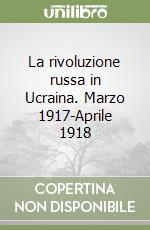 Title :
La rivoluzione russa in Ucraina. Marzo 1917-Aprile 1918
Title :
La rivoluzione russa in Ucraina. Marzo 1917-Aprile 1918Author: Makhno Nestor Publisher: La Fiaccola Nestor Makno, nelle sue memorie, riassume i primi due anni dell'esperienza di organizzazione soviettista dei contadini della regione di Guliai-Polé, in Ucraina, che si contrappose sia alle forze nazionaliste e austro-ungariche, che all'Armata Rossa, nel tentativo di difendere la propria visione e pratica di comunismo contadino anarchico e antistatale. € 20,00
Scontato: € 19,00
|
|
|
1911 |
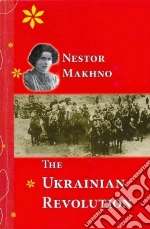 Title :
The Ukrainian Revolution
Title :
The Ukrainian RevolutionAuthor: Makhno Nestor I., Volin Vsevelod (INT) Publisher: A K Pr Distribution The peasant anarchist Nestor Makhno (1888 - 1934) was a key figure of the Russian Civil War (1918-1921). Driven into exile at the end of the war, he produced several volumes of memoirs. Each of these works is self-contained as each deals with a separate phase of his life story. "The Ukrainian Revolution" is the third volume of his memoirs, first published in 1937; this is the first appearance of the work in English. In early July 1918 Nestor Makhno, penniless and starving, returned to his Ukrainian homeland from which he had fled a few weeks earlier to seek political refuge in Soviet Russia. As a peasant anarchist revolutionary he was forced to live a perilous underground existence, for Ukraine was occupied by the powerful Austro-German army, supported by the large landowners. With a tiny band of comrades he embarked on a guerilla campaign against the occupying forces and the rural gentry, concentrating on night raids and roadside ambushes. Once the movement got rolling, the Makhnovists engaged in a total of 117 armed clashes in the fall of 1918. By the end of the year the insurgent movement headed by Makhno controlled up to 70 raions (counties) in southeast Ukraine and had fielded an army capable of defending the liberated zone from its formidable enemies and launching attacks on major cities. Volume 3 of his memoirs tells the amazing story of the birth of this peasant revolutionary army, a force which aimed not only to drive out the unwelcome invaders but to create a new, anarcho-communist society. € 24,40
|
|
|
2005 |
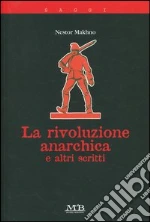 Title :
La rivoluzione anarchica e altri scritti
Title :
La rivoluzione anarchica e altri scrittiAuthor: Makhno Nestor; De Palo F. (cur.) Publisher: M & B Publishing Nestor Ivanovic Makhno nacque il 27 agosto 1889. Figlio di contadini poveri, iniziò a lavorare all'età di sette anni come pastore. La rivoluzione del 1905 lo spinse ad avvicinarsi agli ambienti anarchici e, per la sua militanza rivoluzionaria, venne arrestato nel 1908 e condannato a morte; la pena di morte venne poi commutata in lavori forzati a causa della giovane età. Dopo la firma del trattato di Brest-Litovsk l'Ucraina venne occupata dalle truppe austro-tedesche che appoggiavano il collaborazionista ucraino Skoropadsky. Le campagne ucraine non erano immuni dall'ondata rivoluzionaria che percorreva il paese e Makhno riuscì a riunire nell'Armata rivoluzionaria insurrezionale, sotto la bandiera dell'anarchia, un esercito di venticinquemila partigiani. La guerra venne combattuta al fianco dei bolscevichi con i quali si era stipulata un'alleanza tattica ma fra l'Armata insurrezionale e questi ultimi non scorreva certo buon sangue. La guerra civile in Ucraina proseguì con alterne vicende fino alla definitiva sconfitta dei bianchi e degli eserciti stranieri. Nel novembre 1920 l'Armata rossa attaccò. La sconfitta fu inevitabile e Makhno, ferito alla testa e in stato di incoscienza, venne trasportato in Romania dai suoi compagni in fuga. Ristabilitosi si trasferì in Polonia dove venne arrestato a Danzica. Riuscì ad evadere e nel 1926 raggiunse altri esuli russi anarchici a Parigi, dove morì pressoché dimenticato. Alcuni hanno voluto vedere in Makhno un tentativo di feconda sintesi fra anarchismo e marxismo. € 18,00
|
|
|
2000 |
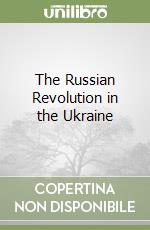 Title :
The Russian Revolution in the Ukraine
Title :
The Russian Revolution in the UkraineAuthor: Makhno Nestor Publisher: Consortium Book Sales & Dist € 7,40
|
|
|
1996 |
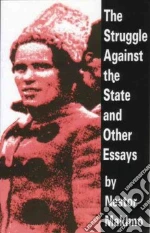 Title :
The Struggle Against the State & Other Essays
Title :
The Struggle Against the State & Other EssaysAuthor: Makhno Nestor, Skirda Alexandre (EDT), Skirda Alexandre Publisher: Consortium Book Sales & Dist Born of peasant stock in Gwlyog-Polye, Ukraine, Nestor Makhno became an anarchist after the Russian Revolution of 1905. Sentenced to death for armed struggle, his sentence was commuted to life imprisonment. Liberated in 1917, he organized an army of anarchist resistance against both the Bolsheviks and the White counter-revolutionaries. Throughout his period of struggle, he consistently advocated the creation of anarchist communism in the most difficult and impractical of conditions. Forced to flee by the Bolsheviks, he eventually ended up in exile in Paris. Marginalized and impoverished, in poor health as a result of wounds sustained in fighting against the Whites and the Bolsheviks, and time spent in prisons inside tsarist Russia before the Revolution and in Eastern European prisons en route to exile afterwards, Nestor Makhno wrote occasional essays in self-vindication and in vindication of the peasant insurgent movement that bore his name. Published primarily for fellow-exiles, these essays ranged from the theoretical and analytical, establishing him plainly as a deliberate as well as a visceral anarchist, to challenges thrown out to his enemiesincluding some Jewish anarchists - to produce proof of the alleged anti-Semitism of his movement in revolutionary Ukraine. He remained politically active, contributing to Delo Truda and other papers, and helped create the Organizational Platform Of The Libertarian Communists. Makhno was determined that the next time anarchism, acting in the light of experiences dearly bought, revamped and more disciplined thanks to its Organizational Platform, might reap the rewards proportionate with the commitment and sacrifice of its activists. Nestor Makhno died from tuberculosis on July 25, 1934, aged 44. The essays in this volume date from his period in exile. € 11,80
|